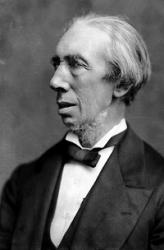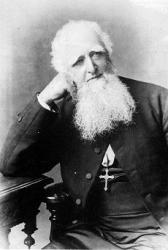Planning worship?
Check out our sister site, ZeteoSearch.org,
for 20+ additional resources related to your search.
- |
User Links
Person Results
‹ Return to hymnal



Export as CSV
F. A. Gore Ouseley

1825 - 1889 Person Name: Rev. Sir F. A. G. Ouseley, Bart. Hymnal Number: 255 Composer of "ALL THINGS BRIGHT" in The Children's Hymn Book Born: August 12, 1825, London, England.
Died: April 6, 1889, Hereford, England.
Buried: Church of St. Michael and All Angels, Tenbury Wells, Hereford and Worcester, England.
Gore-Ouseley was educated at Oxford University (BA 1846, MA 1849, DMus 1854), and was ordained in 1849. In 1855, he was appointed Oxford Professor of Music, succeeding Henry Bishop. At that time, Oxford music degrees were easy to obtain, as there were no conditions of residence. Candidates only had to submit a musical composition, (e.g., for choir or orchestra). This was then approved by the examiner, rehearsed and performed to a small, select audience at Oxford. As far as Ouseley was concerned, this only meant two or three trips to Oxford each year, usually for two or three days each time, as there was no music "taught" in the university and very little in Oxford itself at the time.
Also in 1855, Ouseley was appointed Precentor of Hereford Cathedral, a post he held for the next 30 years, before becoming a Canon there. Although theoretically in charge of the cathedral choir, Ouseley only had to be in residence at the cathedral two months each year, and he arranged these to take place during the summer vacation, when he was not required to be at his College, although such was his commitment that he did make regular visits to the cathedral, which was only 18 miles from his College at St. Michael’s.
His College of St. Michael’s, Tenbury, a "model" choir school, opened in 1856, mostly at his own expense. He founded the College and was its first Warden, which was the greater part of his work for the next 33 years.
Ouseley’s compositions covered a wide range: operas, songs, chamber music and organ pieces. His works include the following treatises:
Harmony (London: 1868)
Counterpoint (London: 1869)
Canon and Fugue (London: 1869)
Form and General Composition (London: 1875)
--www.hymntime.com/tch/
F. A. Gore Ouseley
Raphael Courteville
? - 1772 Person Name: R. Courteville Hymnal Number: 371 Composer of "ST. JAMES" in The Children's Hymn Book Courteville, Raphael or Ralph (d. 1772), organist and political writer, was the son or grandson of one of the gentlemen of the Chapel Royal who bore the same name, and who died on 28 Dec. 1675. The organ from the Chapel Royal was presented by Queen Mary in 1691 to the church of St. James's, Westminster, and on 7 Sept. in the same year a Ralph Courtaville, who had been strongly recommended by the Earl of Burlington, and who had previously been a chorister in the Chapel Royal, was appointed the first organist, with a salary of 20l. per annum for himself and 4l. for a blower.
This Courteville, Courtaville, or Courtivill, was no doubt the composer of six ‘Sonatas composed and purposley (sic) contriv'd for two flutes,’ published by Walsh about 1690; of a song introduced in Wright's ‘Female Virtuosoes,’ and supposed to have been written by Ann, countess of Winchilsea; of a very graceful song, ‘To Convent Streams,’ in ‘Duke and no Duke,’ and of songs in ‘Oroonoko.’ He was one of the composers who furnished the music for part iii. of D'Urfey's ‘Don Quixote’ in 1695. The well-known hymn tune, ‘St. James's,’ is also by him. It has been supposed that this Courteville died about 1735, and was succeeded by his son of the same name; but as the vestry minutes of the parish, in which all appointments, &c. are carefully recorded, contain no mention of such a change of organists, while no record of the father's death can be found, we are compelled to believe that the existence of the son is a mere assumption, made in order to account for the long tenure of the post by a person or persons of the name of Courteville.
This conclusion is strengthened by various entries in the vestry minutes; in January 1752–3, and again in June 1754, letters are written to him warning him that unless he attends personally to the duties of the post he will be dismissed. Whether he endeavoured to perform the duties himself after this we do not know, but he was certainly not dismissed, and shortly afterwards an assistant, ‘Mr. Richardson,’ was appointed. On 12 June 1771 it was reported to the vestry that Courteville gave this assistant only one quarter of his salary for doing the whole work, and he was thereupon ordered to share the payment equally with Richardson. Seven years before this, in 1764, the assistant, with two others, was consulted as to the state of the organ and the undertaking of repairs to its structure. Neither at this time, nor when the improved instrument, repaired by Byfield, was tried, was Courteville's advice asked in the matter, from which we may conclude that he was long past all work, although he was allowed to keep the post.
This Raphael Courteville, whether or not he be identical with the first organist of the church, took a somewhat active part in politics towards the end of Sir Robert Walpole's administration. He is stated to have married, on 14 Sept. 1735, a lady named Miss Lucy Green, with a fortune of 25,000l. In 1738 he published ‘Memoirs of the Life and Administration of William Cecil, Baron Burleigh, &c., including a parallel between the State of Government then and now,’ with preface and appendix of original papers, dedicated to the Right Hon. Edward Walpole, secretary to the Duke of Devonshire. It is signed only ‘R. C.,’ and was printed for the author in London. He was the reputed author of ‘The Gazetteer,’ a paper written in defence of the government, and it was probably in consequence of this production that he acquired the nickname of ‘Court-evil.’ He also wrote a pamphlet published in 1761, entitled ‘Arguments respecting Insolvency.’ On 4 Dec. 1742 a letter appeared in No. 50 of the ‘Westminster Journal’ bearing his signature, to which were appended the words, ‘Organ-blower, Essayist, and Historiographer.’ The letter was undoubtedly written as a joke, probably upon his own genuine productions; it is of course not by himself, and the point of the joke is impossible now to discover, but the appearance of his name in this connection proves that he was more or less a well-known character. He died early in June 1772, as on the 10th of the month he was buried, and his place was declared vacant at the vestry meeting of that date.
[Grove's Dict. of Music; Hawkins's Hist. of Music; Notes and Queries, 2nd ser. x. 496; Registers and Vestry Minutes of St. James's, Westminster; Cheque-books of the Chapel Royal; Westminster Journal, quoted above; Brit. Mus. Cat.]
--en.wikisource.org/wiki/
Raphael Courteville
H. Fleetwood Sheppard
1824 - 1901 Person Name: Rev. H. Fleetwood Sheppard Hymnal Number: 51 Composer of "ST. MEINRAD" in The Children's Hymn Book
H. Fleetwood Sheppard
Frederick Alexander Mann
1844 - 1903 Person Name: F. A. Mann Hymnal Number: 91 Composer of "NEW YEAR" in The Children's Hymn Book See his obituary in The Musical Herald, May 1, 1903. The hymnal Hymns of Prayer and Praise (1921) confirms these birth and death dates, in addition to his composing hymn tunes as listed here.
Not to be confused with Frederick Mann, 1846-1928.
--Tina Schneider, 01 July 2014.
=======================
Mr. F. A. Mann was the musical director of the children’s Home at Victoria Park. He possessed a find conception for music; he gave a “reading” and interpretation to everything he touched, even to a children’s hymn. He composed but little; probably his reserve in this respect was due to his high ideals and his reverence for the great masters.
For nineteen years F. A. Mann practiced the musical profession at Lowestoft. Here he was organist successively of the Parish Church of St. Margaret, and of the church at Kirkley. His power as a choir-trainer was soon discovered by other churches, including nonconformists, and by the help of deputies he managed to train three or four choirs abreast.
For fourteen years he devoted himself to training the choir of children belonging to the Children’s Home. Mr. Mann understood children; his poetic musical instinct drew forth their powers; he interested them and they needed no spur.
Excerpt from The Musical Herald, Issues 658-669 (1903)
By John Spencer Curwen
Frederick Alexander Mann
George A. Macfarren

1813 - 1887 Person Name: Prof. G. A. Macfarren Hymnal Number: 89 Composer of "FATHER, LET ME DEDICATE" in The Children's Hymn Book George Alexander Macfarren, Mus. Doc.; b. London, 1813; d. London, 1887
Evangelical Lutheran Hymnal, 1908
=======================
Born: March 2, 1813, Westminster, England.
Died: October 31, 1887, St. Marylebone, England.
Buried: Hampstead Cemetery, London, England.
Brother of Walter Macfarren, George was a principal of the Royal Academy of Music; professor at Cambridge University; conductor at Covent Garden, London; program note writer for the Philharmonic Society; and editor of Handel and Purcell. He wrote 18 operas, 13 oratorios and cantatas, 9 symphonies, and 162 songs. He went blind in 1860, and was knighted in 1883.
Sources:
Frost, p. 681
Lightwood, p. 189
Nutter, p. 460
http://www.hymntime.com/tch/bio/m/a/c/macfarren_ga.htm
===============================
http://en.wikipedia.org/wiki/George_Alexander_Macfarren
George A. Macfarren
Henry Lascelles Jenner

1820 - 1898 Person Name: Bishop Jenner Hymnal Number: 329 Composer of "PRESTON" in The Children's Hymn Book Jenner, Henry Lascelles, D.D., was educated at Trinity Hall, Cambridge (LL.B. 1841, in honours; D.D. 1867). Taking Holy Orders in 1843, he held several appointments until 1866, when he was consecrated Bishop of Dunedin. He retired in 1871. He is at present [1891] vicar of Preston-next-Wingham, Diocese of Canterbury, to which he was presented in 1854. His hymn in the 1889 Supplemental Hymns to Hymns Ancient & Modern, "Christians, sing out with exultation" (Christmas), is a translation of "Faisons éclater notre joie." See p. 391, ii.
--John Julian, Dictionary of Hymnology, Appendix, Part II (1907)
=============
Jenner, H. L., p. 1574, i. Bp. Jenner was born in 1820, and died in 1898. In C. W. A. Brooke's Additional Hymns, 1903, Nos. 962-966 are by Bp. Jenner and "A. Jenner." They are the "Catechism in Verse," and consist of 50 stanzas and a "Kyrie." They are well adapted for singing in connection with catechising in Church and School.
--John Julian, Dictionary of Hymnology, New Supplement (1907)
Henry Lascelles Jenner
Edward W. Barber
Hymnal Number: 141 Composer of "SAN REMO" in The Children's Hymn Book
Edward W. Barber
Langdon Colborne
Hymnal Number: 152b Composer of "COLWYN" in The Children's Hymn Book
Langdon Colborne
John Hampton
Person Name: Rev. J. Hampton, M. A. Hymnal Number: 100 Composer of "ST. KATHARINE" in The Children's Hymn Book
John Hampton


 My Starred Hymns
My Starred Hymns


